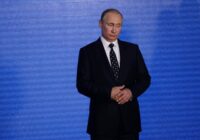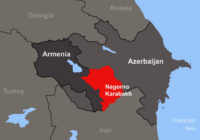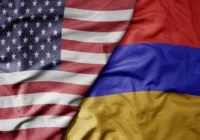Central Asia and the Caucasus, stretching from the Black Sea to China’s western borders, once quietly navigating their post-Soviet identity, are now thrusting themselves onto the world stage. Kazakhstan, accounting for 70% of the region’s total foreign direct investments, is strategically wielding its wealth to play an active role in the region.
Kazakhstan is pushing for peace between Armenia and Azerbaijan. This two-pronged effort aims to solidify Kazakhstan’s position as a regional leader while unlocking economic benefits. A peace deal would not only boost trade between the warring nations, but also pave the way for the Middle Corridor trade route — a strategic path that conveniently runs through Kazakhstan. By facilitating peace, Kazakhstan hopes to loosen Russia’s grip on the region and forge stronger ties with other nations.
Astana and Yerevan turn a new page in south Caucasus relations
Kazakh President Kassym-Jomart Tokayev hosted Azerbaijani and Armenian foreign ministers in Almaty for talks aimed at a lasting peace between the longtime South Caucasus rivals. Tokayev offered to mediate after his first official visit to Armenia on April 15. However, these negotiations occur amidst growing street protests in Yerevan against a demarcation deal, with Baku aiming to solidify gains from last year’s swift offensive in Nagorno-Karabakh.
Astana and Yerevan, partners in various regional organizations, haven’t had a presidential visit in five years. Tokayev’s trip to Armenia marks a turning point. Relations soured in recent years because Astana backed Baku in the Nagorno-Karabakh conflict. This sparked harsh protests in Armenia against then-Kazakh President Nazarbayev in 2016, forcing him to cancel his planned visit. With the region’s situation changing, the current leaders are seeking a fresh start.
Economic cooperation and investment took center stage during the discussions. Both leaders pushed to expand trade. Tokayev pledged to significantly increase Kazakh exports to Armenia, aiming for $350 million — a huge jump from the reported $33.4 million this year. Road transport boomed in 2023, with a 21% surge in volume compared to 2022 (6,936 tons vs. 5,748 tons). To smooth operations between Astana, Almaty, Shymkent and Yerevan, the leaders amended and ratified a 2006 agreement on international road transport. Tokayev further praised Armenia’s efforts to restore transit connections in the South Caucasus and endorsed Prime Minister Nikol Pashinyan’s Crossroads of Peace initiative, which aims to improve communication channels between Armenia, Azerbaijan, Iran and Turkey.
Armenia is actively distancing itself from past alliances. Pashinyan’s recent criticisms of the Collective Security Treaty Organization (CSTO) and the politicization of the Eurasian Economic Union under Russia’s leadership signal a clear shift in Armenia’s foreign policy. Furthermore, Russia’s invasion of Ukraine significantly impacted Armenia’s recalibration. With the Kremlin preoccupied with Ukraine, Armenia sees a window of opportunity to pursue new alliances without immediate Russian pressure. Kazakhstan’s criticism of Russia, alongside its ties to Baku and Ankara, shows a strategic move for its own interests in the shifting region.This situation offers mutual benefits for both Armenia and Kazakhstan.
The EU and Central Asia forge a new trade route
On April 15, Tokayev and Pashinyan vowed to deepen Caspian ties and fast-track the Middle Corridor. This is critical. Before the Ukraine war, 86% of Europe-China land trade went through Russia’s Northern Route. Western sanctions crippled its appeal. The EU greenlit the construction of a Black Sea electric cable. This cable will carry energy from Azerbaijan and Georgia all the way to Hungary, Romania and the rest of Europe. Moreover, the EU seeks to break free from Russian dependence and champions the Middle Corridor, a new Central Asian route.
Kazakhstan positions itself as a key player on the Middle Corridor, mirroring the ancient Silk Road route from China to Europe. Astana recognizes the abundant opportunities this presents and numerous EU leaders have flocked to the capital with high-profile visits..
The EU is pushing for stronger ties between the South Caucasus and Central Asia. Kazakhstan’s oil and uranium exports are a boon to the EU. Kazakhstan ranks as the world’s leading producer and exporter of raw uranium, supplying over 21% of the EU’s nuclear energy needs. Central Asia aligns perfectly with the EU’s Global Gateway Initiative, a major project focused on improving port and rail infrastructure. The EU strategically positions itself in the region and views the Middle Corridor as a crucial route for infrastructure development.
The South Caucasus and Central Asia, sharing a two-century history, have the potential to form a formidable regional bloc to address contemporary uncertainties. South Caucasus and Central Asian nations are forging their own foreign policy paths, independent of external powers. While regional differences exist, a trend towards regional cooperation is emerging. Brawley Benson notes that Azerbaijan’s President, Ilham Aliyev, has actively strengthened ties with Central Asia’s Turkic states, indicating a strategy to diversify foreign partnerships. Kazakhstan holds a special place within the Turkic world for Aliyev, akin to a favored cousin.
The German Institute for International and Security Affairs (SWP) identified twelve global middle powers, with Kazakhstan standing out. A central player in Central Asia, Kazakhstan leverages its abundant resources and serves as a vital link in the Middle Corridor. Kazakhstan pursues a multi-vector foreign policy, strengthening partnerships for mutual cooperation. However, the region faces instability and external shocks. The Black Sea-Kazakhstan corridor risks disruption from escalating West-China competition. The Ukraine conflict adds another layer of uncertainty, as a Russian victory could hinder development of a rival economic corridor.
Divided rather than united, the eight states of the South Caucasus and Central Asia risk becoming entangled in rivalries. This vulnerability empowers assertive global powers. To counter this, the region must prioritize cooperation over competition. Embracing reconciliation can foster unity and strengthen their position in the face of global challenges.
[Ali Omar Forozish edited this piece]
The views expressed in this article are the author’s own and do not necessarily reflect Fair Observer’s editorial policy.
Support Fair Observer
We rely on your support for our independence, diversity and quality.
For more than 10 years, Fair Observer has been free, fair and independent. No billionaire owns us, no advertisers control us. We are a reader-supported nonprofit. Unlike many other publications, we keep our content free for readers regardless of where they live or whether they can afford to pay. We have no paywalls and no ads.
In the post-truth era of fake news, echo chambers and filter bubbles, we publish a plurality of perspectives from around the world. Anyone can publish with us, but everyone goes through a rigorous editorial process. So, you get fact-checked, well-reasoned content instead of noise.
We publish 2,500+ voices from 90+ countries. We also conduct education and training programs
on subjects ranging from digital media and journalism to writing and critical thinking. This
doesn’t come cheap. Servers, editors, trainers and web developers cost
money.
Please consider supporting us on a regular basis as a recurring donor or a
sustaining member.
Will you support FO’s journalism?
We rely on your support for our independence, diversity and quality.









Comment